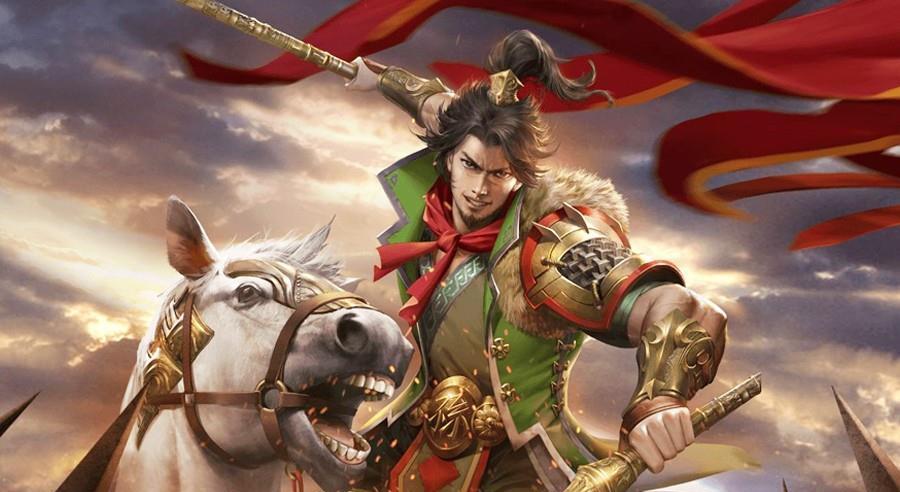During the Three Kingdoms period, there were many heroes, and Sun Ce, the "little overlord", was one of them. Speaking of Sun Ce, this is also a "werewolf", a little more ruthless than a fierce person. After the death of his father Sun Jian, Sun Ce took his younger brother Sun Quan and killed a bloody road with wolves around him, laying a foundation for himself. As far as Chong Sun Ce's ability is concerned, he is definitely worthy of the title of "Little Bully". Unfortunately, the hero died early, and Sun Ce, who was only twenty-six years old, died. However, what is surprising is that before Sun Ce died, he did not pass on the foundation to his son Sun Shao, but to his younger brother Sun Quan.

In fact, Sun Ce is really not easy, his father Sun Jian was ambushed when he was thirty-seven years old, and then lost his life in the war, and Sun Ce, who was only seventeen years old, took up the burden. This child, who is still a high school student in modern society, not only did not become decadent and flustered after the death of his father, but instead raised his spirit and shouldered the burden on his shoulders. However, Sun Ce eventually embarked on a similar path to his father Sun Jian. Sun Ce was assassinated during a hunt and subsequently fell seriously ill and died. Unlike his father, Sun Ce, as the eldest son at that time, became the head of eastern Wu, and now it is not his son who takes over Sun Ce's burden, but his younger brother Sun Quan. In fact, Sun Ce's reason for doing this is very simple.
First of all, Sun Ce's son, Sun Shao, was difficult to assume. In fact, there are very few records about Sun Shao in history, and even the specific birth and death years of Sun Shao are not recorded in detail. From here, it is enough to see that in Sun Shao's lifetime, he did not do anything earth-shattering. Extrapolating from Sun Ce's age of death, Sun Ce was only twenty-six years old when he died, and Sun Shao's age at that time was likely to be only single digits. At such an age, it is really difficult to shoulder the responsibilities of a major general in the war years. And Sun Ce didn't have time to watch his son grow up slowly.
Secondly, his younger brother Sun Quan is indeed much stronger than his own son. When Sun Ce pacified the Jiangdong area, Sun Quan, who was only fifteen years old, was appointed as a local official of Yang Xian because of his outstanding ability. During his tenure, Sun Quan not only showed his talent for governance, but also accumulated a lot of experience in governance. Even the envoys of the Han Dynasty at that time praised Sun Quan when they were on their mission to Eastern Wu: only the middle brother was filial piety, his appearance was strange, his bones were not strong, and he had a noble appearance. In the face of such a younger brother, where is Sun Ce still uneasy?
Moreover, from the perspective of conspiracy theories, Sun Ce's approach is also to protect his son. If Sun Ce insisted on passing on the position to his son, then there would be a weak monarch and a strong subject, and this courtier still had the right to inherit. So, can his son still sit firmly in this position? Instead of waiting until the younger brother turned back on his son because of impatience, it was better to give the position to his younger brother. In this way, maybe the younger brother will still look at his own discernment and let his son go. However, judging from some of Sun Shao's later life trajectories, Sun Ce's decision was right. After Sun Quan was proclaimed emperor, Sun Shao was given the title of Marquis of Wu, and later renamed Marquis of Shangyu, with a hereditary title.
Therefore, passing the throne to Sun Quan in public and private, are all the superior choices of Sun Ce. Considering the overall situation, passing the throne to Sun Quan was obviously more beneficial to the development of Eastern Wu. Because Sun Quan not only had better ability than Sun Shao, but also had a much greater influence in the court than Sun Shao. Young and helpless son and older brother with a foundation, Sun Ce certainly knows who to choose. From a private point of view, would Sun Quan, who was obviously more capable than Sun Shao, always be willing to submit to his nephew? You know, the human heart is the most untested! That is to say, from the perspective of Sun Shao's personal safety, Sun Ce was reluctant to let his son be in danger. After all, even being a rich man is happier than sitting on the tip of a knife!